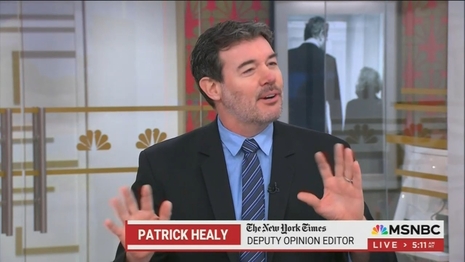 Patrick Healy changed jobs this year at The New York Times from Deputy Opinion Editor to Assistant Managing Editor for Standards and Trust. This is a little funny for me, since Healy once asked me on a panel discussion "What do you have against democracy?"
Patrick Healy changed jobs this year at The New York Times from Deputy Opinion Editor to Assistant Managing Editor for Standards and Trust. This is a little funny for me, since Healy once asked me on a panel discussion "What do you have against democracy?"
This week, he interviewed two Times religion reporters for an article titled "How Two Times Reporters Cover Christianity in a Polarized America." Naturally, this means Christians polarized by Trump.
Patrick Healy channeled the views of the Trump trashers: “President Trump hangs over your beat in a way that frustrates some people. One Times reader recently wrote of Trump: “Kind of wondering when the ‘Christians’ will recognize who he is. Everything he says and does is ‘anti-Christian.’ When he has a golden calf forged, will they celebrate that, too?” I know you both get asked questions like that. How do you answer them?"
Reporter Ruth Graham offered a reasonable answer: “Mercifully it is not my job to decide who is a 'real Christian,' which often feels like the subtext of those questions. It’s just not my role as a reporter to adjudicate that. What I can report is how a person describes themselves, what they say they believe, and what they do and say.”
That sounds like a fairly objective method...except that's not always Ruth's approach, like constantly warning of Southern Baptists who were "ultraconservatives." She also touted Christians becoming transgender advocates -- the conservatives were "vociferous," while the people going left were conducting "earnest searches for understanding."
Elisabeth Dias felt more pain on behalf of Christians who struggle with Trump’s most controversial policies: “I’ve come to describe Christianity as plural, not singular. There are many different expressions of Christianity, so many different theological beliefs. Many believers see their version as the pure or ultimate Christianity. Families and churches have experienced excruciating splits over Trump and his policies, like vaccines or immigration. In this question I also hear worries about what moral vision wins out, what that means for people you love, and a kind of personal trauma that happens when one’s own moral code feels denied.”
Like Ruth Graham, Dias can please the liberal Times reader with fear-mongering, like this front-page rager: “The Far-Right Christian Quest for Power: ‘We Are Seeing Them Emboldened’ -- Political candidates on the fringe mix religious fervor with conspiracy theories, even calling for the end of the separation of church and state.”
Most Christians who have voted for Trump understand that his personal behavior and ego-driven swagger are not Christian in character, but many of the policies they support -- including religious freedom -- have been firmly backed by Trump as president. Somehow, the liberals can't apply their big brains to understanding the distinction at work.
Healy also relayed the typical Times reader wanting more leftist terminology: "I want to push on this — some Americans believe the phrase “Christian nationalism” is a factual one to describe the worldview of others, and some of our news articles have featured experts using the phrase about other people."
Graham answered: We’ve thought really carefully about “Christian nationalism.” It’s a term that was originally used by academics and by activists who were critical of the movement they described that way. And very few people used the term to describe their own beliefs. That’s actually changing now, but it’s still essentially people reclaiming what they understand to be a slur. I also think if you asked 10 people what it means, you would get 10 definitions. So for now, I find it more helpful for readers to tell them what a person says and does, rather than to impose a label that would actually be less informative.
When the left says "Christian nationalism," they often mean not only theocracy, but often a racist theocracy -- that's the slur. The Left pretends that their precious "separation of church and state" means that Christians shouldn't vote or lobby for policies that they see as in line with Christian orthodoxy. They want an "atheo-cracy" -- a government with zero religious influence involved.





